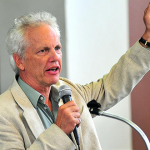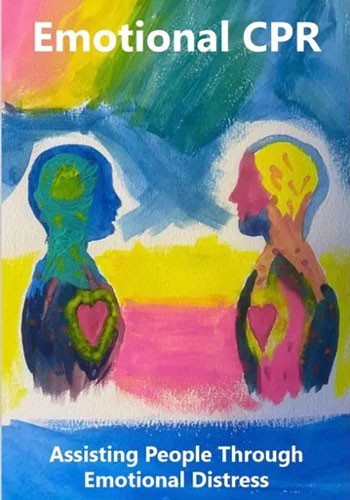An Introduction to Emotional CPR (eCPR)
An Introduction to Emotional CPR (eCPR)
Emotional CPR Book Just Released

Emotional CPR: Assisting People through Emotional Distress recounts how a team, mainly comprising individuals with personal experiences of severe mental health conditions, developed a novel method to aid those in mental health crises. Unlike conventional approaches, this method prioritizes establishing a heart-to-heart connection over diagnosis. By treating individuals as resourceful, the approach empowers them to navigate their path forward, fostering revitalization. This approach reflects how the Emotional CPR developers desired to be treated during their own distress, and how such treatment facilitated their journey through distress. Click here to purchase the book.
On December 12th, our Emotional CPR Coordinator Kimberly Ewing hosted a virtual coffee house to announce and discuss the launch of the book. Click here to view the recording.
Introduction to Emotional CPR
Meet Our eCPR Trainers and Educators
Article on Emotional CPR in NeuroLaunch
We’re excited to share that Emotional CPR was recently featured in an article on NeuroLaunch. The piece highlights the heart of what makes eCPR so powerful—its focus on human connection, peer support, and the capacity we all have to be present with emotional distress. It offers a thoughtful overview of the approach and its growing impact as a community-based mental health practice. You can read the full article here.
Article on Emotional CPR in Wisconsin
Article on Emotional CPR in Wisconsin
A recent article in Wisconsin Watch features two eCPR trainers, Karen Iverson Riggers and Lynn McLaughlin, and discusses how they have used eCPR to provide support and combat social isolation among northeast Wisconsin residents. From the article:
“The pair founded Ebb & Flow Connections Cooperative, which runs a Community Living Room in downtown Appleton. They describe it as an ‘unconditionally welcoming’ space, where community members can socialize, play games, hang out or confide in certified ECPR practitioners.
‘There’s no requirement to belong,’ McLaughlin explained. ‘You just do.’
Their approach to teaching social connection has proved successful enough that groups in several other Wisconsin counties are now trying to replicate the resources they offer. Plus, several state entities say their model is a method for building connection to prevent suicide.”
Click here for the article.
Testimonial
I AM A “FIXER”
by Carmaleta Aufderheide
Last week, I took an online eCPR course. The “e” stands for emotional. I wanted to do this for a few reasons but mainly to continue to inform how I teach and talk to others. I had no idea what I was in for.
As I sat at my computer, sipping coffee, the virtual classroom opened with an upbeat music video playing. I found myself sipping and swaying in tune with the music. People began entering the meeting room and settled in. I recognized the intention of setting the mood…mission accomplished!
The phrase “trauma-informed” is something I never had a good grasp of nor could explain well.
This class helped break new ground in my engagement with everyday happenings from this perspective.
We all have shit we are dealing with. It’s not a competition about who has it worse. I’ve worked hard to communicate openly without putting up walls, which can be easier said than done. This class reconnected me to the importance of how I show up for people.
I’ll admit it – I am a FIXER, at heart. Sometimes I feel like I need a 12-step recovery program for “fixing”. I fight the urge to do this and teach on this…but it’s something I am always working on. As the first day of class came to a close, I was emotionally spent. I had given it my all and witnessed other do the same. Wow…how often does that happen?
Day 2 of class did not disappoint. I have always felt it was a privilege to hold space for people when they feel comfortable enough to share something hard with me. What surprised me though was how this class helped me ask, how do I show up for myself? That’s something I have to work on. By the end of two days, my gratitude for the instructors and fellow participants continues to fill my cup.
Now if you’ll excuse me, I’m going to go do something for me…so I can be there for you.
Studies on Emotional CPR
Emotional CPR is now considered an Evidence-Based Practice!
From our Blog
The NEC Store Has Free Shipping!
Mission:
To train people to assist others through an emotional crisis and to make this practice accessible to people around the world.

 British Columbia Psychosocial Rehabilitation | Advanced Practice is very pleased to announce a webinar with Dr. Daniel Fisher CEO of The National Empowerment Center, and Shontelle Prokipcak from Mental Health and Addiction Services of Ottawa!
British Columbia Psychosocial Rehabilitation | Advanced Practice is very pleased to announce a webinar with Dr. Daniel Fisher CEO of The National Empowerment Center, and Shontelle Prokipcak from Mental Health and Addiction Services of Ottawa! 





